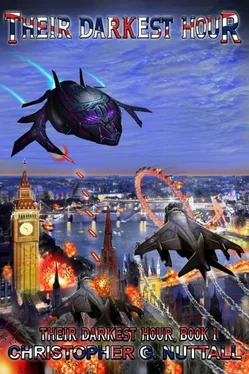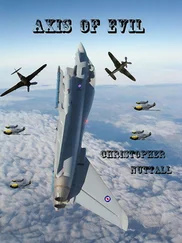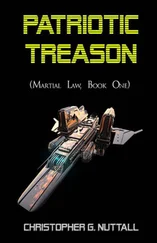“One of the programs we pulled out and studied was definitely designed for English,” Linux informed him. “The others, however, aren’t for any recognisable language. You’d think they could speak French or Russian or Chinese, but they don’t seem to have programs for those translations. I assume that they might not bother to outfit a force landing in Britain with such systems, yet it’s an odd oversight…”
“Very odd,” Gavin agreed. It struck him a moment later. “There are other aliens out there!”
“So it would seem,” Linux said. “At least six, unless the translation programs are for other Leatherneck languages. We have different languages on Earth — why shouldn’t they have something comparable on their worlds. Unfortunately, we were unable to locate any files on the other alien races. But we’re still looking. I’m afraid they didn’t bother to design any search engines for their computer networks.”
“Or maybe you haven’t found those yet,” Gavin said. “Tell me something. Can you alter their files? Twist the data they’re gathering on our people? Slip records into the registries…?”
“I don’t think so,” Linux admitted. “I told you the system was crude — well, it’s very crudeness provides some protection from people like me. We can read the files — hell, we’ve managed to download terabytes of data we can study without having to remain linked to their network — but altering them would certainly be noticed. Their core memory systems are ROM — ah, Read Only Memory. We can’t change them without physical access to the system.”
“Which we’re not likely to get,” Gavin agreed. He patted the young man on the back. “Good work.”
“The intelligence staff are working their way through the dump,” Linux added. “They’re finding it slow going — if there is a listing or filing system, it isn’t one that we recognise. It used to be possible to lose files inside computer networks unless one happened to know its precise location. I have a feeling that their superior officers probably have their own files concealed from everyone else. Who knows? Maybe they all gather dirt on their fellows for advancement.”
“I was hoping you’d be able to tell me more about their society,” Gavin admitted. “I don’t suppose you pulled something like Wikipedia out of their database?”
“I don’t think they’d want Wikipedia if they could support it,” Linux said. “Or Google, for that matter. Or any of the other computer programs that put power in the hands of the users, rather than systems administrators and the big corporations…”
“I think they have more problems right now,” Gavin said, dryly. He had a relative who had worked for Google Ireland. The Leathernecks had largely ignored Ireland, apart from bombarding its military bases and destroying the fragile truce between Ireland’s various factions. After the remaining British soldiers had been pulled out, Ireland had degenerated into fighting between different factions, with thousands of refugees trying to make it to Britain. Perhaps the aliens would intervene if they thought there was something in Ireland worth taking. Or maybe they had too many other problems on their hands. “What can we do with the access we have? And can they block us out if they realise that we’ve hacked their systems?”
“I rather doubt they can block us unless they’re willing to cripple their networks,” Linux said. “But if they do have enemies out there, they may have security tricks we haven’t seen ourselves. Maybe their enemies have a cunning plan to hijack their wireless computer networks and render their fleets helpless. And then sexy androids will rule the galaxy.”
He saw Gavin’s face and cleared his throat. “Sorry, anyway… we may be able to piggyback on their network to send messages to our own people,” he added. “And seeing that they all radiate wireless signals, we could probably start tracking their movements. Or… we could rig up a sensor and link it to an IED. When the signals reach the right intensity, they trigger the IED and it explodes in their face. Or…”
Gavin held up a hand. “Good thinking,” he said. “Let me know if there’s anything else we can do…”
Linux hesitated. “It might be possible for us to interfere with the network,” he said. “We might be capable of taking it down completely for short periods of time, cutting their small detachments off from higher authority. The result would be absolute chaos… but they’d know what we’d done. God alone knows how they’d react.”
“I see,” Gavin said. “I’ll have to give that some thought.”
He scowled. After the slaughter in London, they needed to find a way to hit back at the aliens, one that would convince them that slaughtering humans would draw a massive response. But how could they do that without revealing what few aces they had in their hand? And what if the aliens decided to destroy the entire human race in response?
* * *
“Panda Cola,” the logistics officer said. He tossed a can at Chris, who caught it neatly and scowled down at the label. “All kept nice and cool for our gallant fighting men.”
“Piss off,” Chris said. Panda Cola was included in the British Army’s Horror Bags — the packed lunches that were served to soldiers on duty. It was generally believed that it was produced by forcing a Panda to drink ordinary Coke, then bottling their urine and passing the cans to soldiers, who would then have to drink the foul liquid. Chris had heard during his training that the Ministry of Defence allocated 47p to procuring each can of Panda Cola, which raised the question of precisely what happened to the remaining 42p. “You’d think we could get better rations now we’re living off the land.”
He scowled around the resistance base. Calling it a base was really too much; they’d built shelters under the trees, trenches just in case the aliens stumbled over their position and a latrine some distance from the sleeping rolls. Some units, he’d heard, were living in civilian homes, but the aliens were getting better at running random patrols through seemingly-deserted hamlets. The base was safer, apart from the possibility of poisoning themselves by drinking army-issue Coke. He opened the can, braced himself and took a swallow. It tasted just as bad as he remembered.
“At least we’re eating rabbits,” one of the other soldiers pointed out. It was true; hunting skills they’d been taught were actually coming in handy. The woodland was full of small animals and vegetation that could be eaten, although they were being very careful with the mushrooms. If one of the soldiers managed to poison themselves, they wouldn’t be able to get them proper treatment. “We could be eating that foul muck they served us in Edinburgh.”
“I told you that you should have taken the pizza,” his friend pointed out. Chris felt a pang for the comrades he’d lost in London. They’d all been jammed together from various units that hadn’t made it out intact, but some of them had known each other beforehand. “When has the Army ever fed us well?”
Chris snorted. The Army Chefs — the Ration Assassins — had the hardest training course in the British Army. It had to be — no one had ever actually managed to pass, or so the soldiers joked amongst themselves. Now, he almost missed them, even though fresh rabbit stew was surprisingly tasty. Despite himself, he found himself wondering how they were going to cope when winter finally came along. It would be much harder to find food then — and the aliens, the crafty buggers, were being careful about what they doled out to the civilians. It would be easy to see if certain civilians were eating more than they should.
He pushed the thought aside, remembering the horror stories that had floated up from London. They’d have to make the aliens pay for that, but how? It had to be something spectacular… absently, he remembered the interior of the alien vehicles. Humans probably couldn’t drive them without major effort. But they did have collaborators driving their vehicles…
Читать дальше












